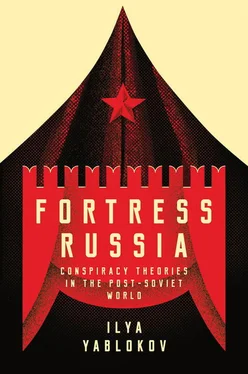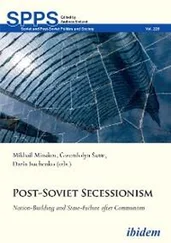This chapter looks at how conspiracy notions have been used by the regime as a tool in domestic politics to delegitimize third sector organizations and other political rivals. It will start by looking at the role the notion of conspiracy played in the Yukos affair, because this was the first public campaign against Putin’s political rivals which rested on conspiracy theories. It will then consider how regime changes in the CIS countries affected the conspiratorial perception of NGOs among the political elites inside Russia. It will turn next to the ways in which fear of the ‘colour revolution’, which was disseminated through the media, was used to justify amendments to the legislation regarding NGOs. Finally, the chapter will discuss how post-electoral public activism in 2011–12 triggered another wave of state repressions against NGOs, and what role conspiracy theories played in this.
From Conspiracy Theories to Conspiracy Practices
On 25 October 2003, Mikhail Khodorkovsky, who was then the richest man in Russia, was arrested in Novosibirsk and spent the next ten years in prison, charged with tax evasion. He had been one of the most longstanding leaders of the opposition to Putin and his aides, and so his incarceration illustrates the sort of treatment the Kremlin is capable of meting out to its major opponents. Moreover, this was the first time in the post-Soviet era when anti-Western conspiracy theories were used domestically as a political instrument against one of Putin’s main rivals. Accordingly, in many respects the Khodorkovsky case was a watershed in the use of these concepts as a political tool.
Khodorkovsky’s company, Yukos, was one of the most advanced and successful companies in Russia. It had influential connections around the world, including political and business elites in the USA and Europe such as the Rockefeller family, Henry Kissinger and George Soros (Khodorkovskii and Gevorkian, 2012). Khodorkovsky himself was an icon of post-Soviet entrepreneurship, whose company was a serious power broker and wielded influence both in Moscow and the regions. In the 1990s Khodorkovsky was one of the oligarchs who played an active part in politics and participated in the 1996 campaign to elect Yeltsin. After the 1998 economic crisis, Yukos was restructured and rapidly became one of the foremost companies in Russia, having grown exponentially to a market capitalization of $30 billion in 2003. As Thane Gustafson (2012, p. 284) writes, Khodorkovsky sought to gain a reputation as ‘the indispensable man, the capitalist hero fighting against the bureaucratic enemy, fighting against value-destroying state ownership’. This eventually backfired.
Khodorkovsky was not only interested in money and power, but also made generous investments in the development of civil society. In 2001 he set up a charity organization, Open Russia, which funded various civic activities through its branches in the regions and was one of the main drivers in the development of regional intellectual, economic and political elites in Russia. Khodorkovsky’s ambitions were not only limited to business and influence, then. There was a good chance that he would begin to challenge Putin for leadership of the country. As a result, he paid a high price for his activities. The clashes between the political and economic elites, compounded by the approaching parliamentary elections in autumn 2003 which the Kremlin saw as crucial if it were to secure its hold on the country, made Yukos and its owner the target of a very real plot.
The case against Khodorkovsky was placed by conservative groups of pro-Kremlin elites in the context of a ‘creeping conspiracy of oligarchs’ who saw Putin as a weak leader who should be replaced. A powerful example of the conspiratorial framing of this affair can be found in reports by the Council for National Strategy, which was headed by two political consultants, Stanislav Belkovskii and Iosif Diskin. Richard Sakwa (2014, pp. 37–8) argues that this organization has been crucial in forming the ideological views of siloviki – a cohort of Russian elites, directly related to law enforcement and intelligence agencies, whose power has steadily grown since Putin’s arrival in the Kremlin (Treisman, 2007). Many influential members of Putin’s elite are also members of this group; most notably, the prominent Igor’ Sechin, one of Putin’s most powerful aides, who was head of the oil company Rosneft in the 2010s (Dawisha, 2015). As Khodorkovsky himself acknowledged (Franchetti, 2008), Sechin was instrumental in the conspiracy against him. Reports of the Yukos plot were presented to Putin by Sechin and other members of the siloviki to push the president into initiating the case against Khodorkovsky. It turned out that Putin took the threat of conspiracy very seriously, and made his move.
In the autumn of 2002, the Council released its first report under the title The Great Game of Russia ( Bol’shaia igra v Rosiiu ). It claimed that the government was a ‘cabinet of oligarchs’ affairs’ which the Kremlin was not able to control (Kamyshev, 2002). Thereafter the oligarchs were demonized as the driving force in Russia’s politics. In January 2003, the Council released a second report, The Risks and The Threats to Russia in 2003 ( Riski i ugrozy Rossii v 2003 godu ), which aimed to alarm the Kremlin still further. It argued that the oligarchs had no intention of developing the country in the interests of the nation, let alone of preserving its global power. Still worse, these oligarchs apparently had no compunction in selling Russia to the US in exchange for the legitimization of their personal financial assets. Its principal message was populist and anti-elitist, since it called for the fair distribution of wealth in the country:
…[The] ruling class does not consider itself responsible for the preservation of the nation-state and moral foundations of Russia… At the same time, the ruling class does not consider itself responsible for social peace in the country, or for opportunities to develop in the interests of the majority of Russians, which would require the gap between the richest and the poorest groups in the population to be narrowed… That is what the majority of people consider important. (Russkii zhurnal, 2003)
The populist call for social equality, and accusations that the oligarchs were the main power brokers in the country but had no interest in serving the people, were an important concept which was actively used in the electoral cycle 2003–4. With the Kremlin’s support, the newly formed party Rodina (Motherland) had two leaders who shared nationalist and conservative/isolationist views. Sergei Glaz’ev and Dmitrii Rogozin called for a ‘natural resources rent’ tax in their manifesto, demanding reconsideration of how state property was shared out in the 1990s and heavily criticizing the West as Russia’s rival. Their harsh anti-oligarch rhetoric brought them third place in the elections and demonstrated the potential of these ideas for use in domestic political strategies (Sakwa, 2005). Moreover, the denigration of Russia’s role in global affairs, the dramatic reading of the Soviet collapse, and the decrying of Yeltsin’s policies relating to the selling of state assets, were echoed in the rhetoric used by Putin and Surkov in 2005.
The epitome of the anti-oligarch conspiracy panic came in a third report, entitled The State and the Oligarchy ( Gosudarstvo i oligarkhiia ). It unabashedly claimed that the oligarchs – first and foremost Khodorkovsky – were preparing to overthrow the regime. Khodorkovsky indeed had vested interests in changing the government, and did provide financial support to various political parties, in order to wield more influence in the government himself (Sakwa, 2014). The report claimed, in very conspiratorial terms, that this desire for power was concentrated in a small cabal of financial tycoons who profited from extracting fossil fuels, and who would promote their power by appealing to the West for protection. They had neglected the interests of the majority in their attempts to realize their power, and were essentially ‘robber barons’ who had squeezed out every drop of juice they could from the fruits that the weak Russian state had put on offer. The authors of the report went on to claim that the oligarchs were preparing a coup to depose the president and turn the regime into a parliamentary republic that would allow Khodorkovsky to become prime-minister and, later on, the head of state. The oligarchs allegedly planned to carry out these reforms after the parliamentary elections in autumn 2003, helped by loyal deputies in Parliament. According to this plan, the new government, which had the remit to appoint the prime minister, would have chosen Khodorkovsky (Belkovskii, 2003).
Читать дальше
Конец ознакомительного отрывка
Купить книгу












